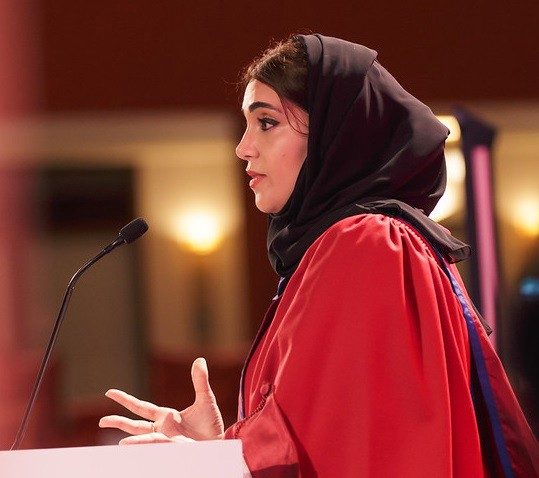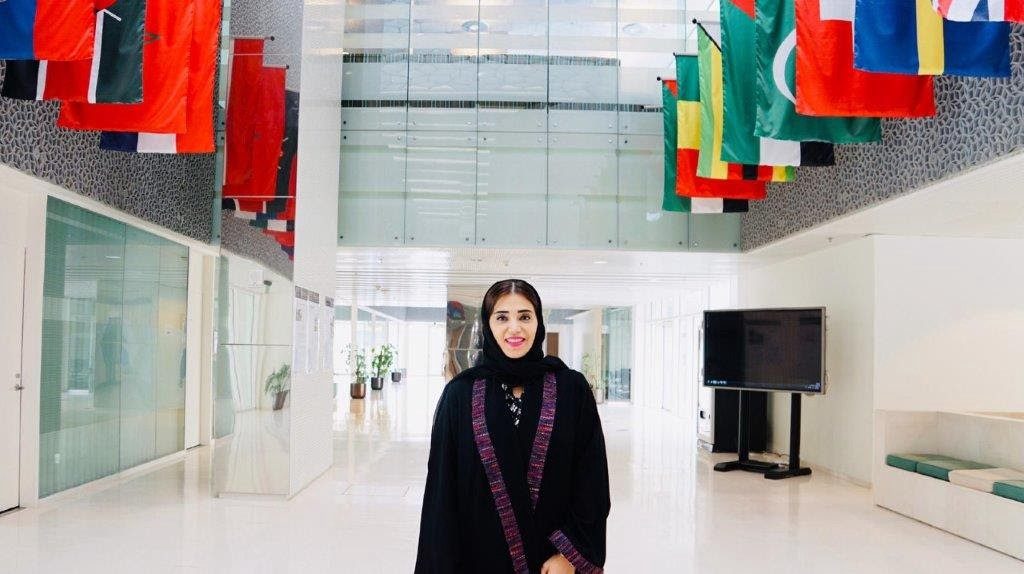by Menatalla Ibrahim
Doha news speaks to leading gender studies scholar, Dr. Amal Mohammed Al-Malki, to find out where she thinks Qatari women stand in their rapidly changing society.
Recent years have seen huge changes in the way Qatari society sees its women. The country’s fast-paced modernisation and industrialisation, plus profound socio-cultural changes, have forged new identities, changing what is perceived as ‘normal’ when it comes to gender roles.
Education-wise, the number of female graduates has been increasing yearly. According to statistics from Qatar Foundation (QF) and other universities, roughly 60% of graduates have been women in the past three years. In addition, in the past decade, more women have held powerful and prominent positions in the country, putting them right under the spotlight where young females can see them and be inspired.
Doha News spoke with Dr. Amal Mohammed Al-Malki, Founding Dean of the College of Humanities and Social Sciences at QF’s Hamad bin Khalifa University, to understand more about the impact on Qatar of women’s growing empowerment. We asked what more can be done to ensure a bright future for the next generations of Qatari women.
“QNV2030 has indeed put women at the heart of the plan to move forward and progress across all pillars, posing women as equal participants in the future of Qatar. It has informed the visions of all governmental and semi-governmental entities in Qatar, uniting the overall narrative about the future.
“This has helped different sectors develop their own policies to encourage more women to enter the workforce. Many professions that were gendered have opened up to women. Women’s mobility as well has been improved, which has given them agency over their decisions and actions.
“Women in Qatar, like in many parts of the region, have benefitted immensely from education as the main source of empowerment. Education has led women to enter the job market and contribute to the national economy. Education in Qatar has been championed by both the Father Emir and Her Highness Sheikha Moza bint Nasser, which has led to a strong social and cultural endorsement. Having themselves as the agents of change facilitated the spread and endorsement of the message.”
“Change is gradual, and it has been taking place since the mid-1990s. However, the launch of QNV2030 and the creation of a national narrative in which women occupy an important position was in 2008. This was followed up by years in which women were educated and empowered to occupy new positions. We saw a clear push from the government as we saw them promote women leaders. Qatari women now work in sports, media, business, and many other domains that are new to them.
“Gender roles in society took a reshuffling — and still are, as new sectors are created. We are witnessing the emergence of the creative industry, where more women are entering filmmaking and music.
“Change isn’t easy in closed and traditional societies; thus we need to admit that some women are benefiting more than others — especially those with supportive circumstances and open-minded surroundings where women and their capabilities are believed in.”

Young Qatari females outnumber Qatari males in higher education, according to statistics from QF. In fact, the number keeps growing each year, with more females enrolling in spotlight majors like politics and journalism. What is the significance of this when it comes to women’s development in Qatar?
“This phenomenon signifies women’s easy access to higher education. The quality and diversity of higher education in Qatar has helped women to make their own decisions regarding their future, starting from fields of study.
“We find that women want to challenge the gendered disciplines and the status quo, and venture into fields that were previously male-dominated like engineering, business, and politics. With the first cohorts of women graduating from these and other disciplines, the job market has had to make a lot of changes to embrace a generation of talented and highly qualified women.
“Women are now working in oil companies, some visiting the oil fields. Women work next to men, raising the bar in every field.”
Hamad bin Khalifa University has a couple of programs that focus on women’s development, especially in the Gulf region. As the dean, have you noticed any changes or different, more open, reactions when the topic of women’s empowerment rises?
“The College of Humanities and Social Sciences has launched a master’s degree in women, society, and development in our Middle Eastern Studies Department. The degree focuses on issues related to women in the context of social and economic development in the Middle East, as well as women’s various roles in the advancement of their communities and societies. It draws on a variety of disciplines in social sciences and humanities, ranging from economic and social theory, to development and policy studies, to law and communication studies.
“The program fulfils Qatar’s aspiration to contribute to global, sustainable development in matters related to women and gender issues. It also provides the nation with a think tank capability on women-related issues, which can be used for coherent national policy-making that crosses the commercial, health, education and family sectors.
“And yes, definitely since the launch of the program, students and faculty have been very active in discussing, researching, and engaging with the public on matters pertaining to women. Our students’ masters theses exposed and brought to the surface issues that need to be dealt with in relation to women and their role in society.
“The activities, talks, and workshops organised by the program attracted different groups from the society as well as different institutions that finally found a reliable point of reference to consult and work with.
“The conversation on gender equality has been mainstreamed and has become a topic to be studied, discussed, and implemented in the past three years. For example, Her Excellency Sheikha Hind bint Hamad, CEO and Vice-Chairperson of QF, has spoken and written on the topic of gender equality and pledged a 50/50 gender representation in QF.”
What do you think are the biggest challenges women face in Qatar in terms of trying to pursue high-visibility careers or essential careers that aren’t perceived as ‘women-friendly’? I mean visible barriers, hidden barriers, and external and societal pressures.
“Qatari women are more than capable of occupying decision-making and leading positions, and of venturing into new careers. They are highly educated, ambitious, and risk-taking.
“Having said that, we cannot leave out women who are stifled by their families, outdated customs and traditions, and sometimes by their own internalised insecurities.
“Societal pressures cannot be ignored or undermined in a country as small as Qatar, but if one is willing to take the lead, others will definitely follow. It takes one to change the status quo here, and this is very evident and true. We can see this in the language of precedence that is much used in the media, promoting the first and the pioneer Qataris, whether men or women. Also, another important factor that can facilitate women’s development in Qatar is strategic role-modelling, especially in career paths that were not previously ‘women-friendly’”.
Both mentoring and strong female representation play a significant role in the development of women. Now more than ever, there are many strong female role models in important positions in Qatar. Has representation helped push women in Qatar, and changed some perspectives about women in high positions?
“Of course, representation is the key word here. Women need to be represented in all fields and across all sectors. Girls need to see early on in their lives that everything is open to them, and nothing will stop them.
“This also applies to lead roles and decision-making positions, where Qatari women’s numbers are still low — especially in politics. And here is where the change needs to take place. The glass ceiling in certain fields does exist, and women are still struggling to break through gendered perceptions of leadership and society’s lack of trust in their abilities.
“We should move from the ‘first woman’ and ‘only woman’ narratives. This doesn’t undermine the existing women leaders — on the contrary, they are pioneers and need to be commended. But we should move from the one minister, one university president, one ambassador, one judge, one singer, one filmmaker, one artist narrative to build a critical mass in each field.”
Qatar has come a long way when it comes to women’s empowerment, but what more do you think can be done — in terms of the national and institutional framework — to support women’s empowerment and educational development in the country?
“Qatar has indeed come a long way, but still many things need to be done to improve women’s rights and women’s positions. And here is where our job as intellectuals, professionals, and civil society comes in. As we progress, different needs will arise, so it is imperative to have a solid infrastructure that institutionalises women’s rights and that protects women psychologically and physically and, above all, gives women equal citizenship rights.”
What message would you send to women in Qatar who are aiming to pursue a successful career?
“The move from university into the job market is a big one and involves lots of challenges. One of the things that our education system fails to teach Qatari women is how to represent themselves in a patriarchal world, and how to mitigate challenges and face gender discrimination. The leadership formulas out there never address the specificities of our culture in the Middle East and most importantly in Qatar.
“So, I say: never quit. Each path you take is a valid one because it contributes to building your personal legacy.
“Then think big, and find ways to participate in the making of history of the women of Qatar.”
About Dr. Amal Mohammed Al-Malki
Dr. Al-Malki has published research on topics including the negotiation of identity between east and west, media representations of Arab women, and postcolonial literature. She has published numerous articles and academic journals in the United States and UK. Her book, ‘Arab Women in Arab News: Old Stereotypes and New Media’ (2012) is published by Bloomsbury Qatar Foundation and Bloomsbury Academic, UK. It was lauded as the world’s first comprehensive study of the topic. She also edited ‘The Writer’s Craft: Teaching Creative Writing in Qatar’, published as a part of an initiative honouring Doha as the Arab Capital of Culture in 2010.







